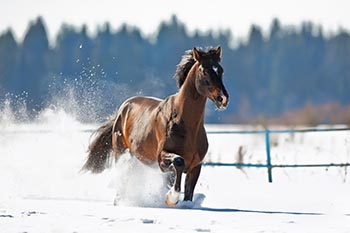Winter Care Tips for New Equine Clients

The following information provides tips for clients who are new to owning horses.
Outdoor Life
As a horse heads into the winter season its coat grows longer and a layer of fat forms beneath its skin. The change in its coat and the added layer of fat will help to provide insulation and protection from the winter elements. Horses that are raised out-of-doors throughout the year will adapt to most winter climate adjustments as long as they are provided with adequate shelter that offers protection from cold wind, rain, and snow.
Stabled Animals
Horses that have been kept in a heated barn do not fare as well in the winter elements. These animals typically do not have the naturally occurring added insulation and are more likely to chill and become ill if placed outside in winter weather. These animals require additional protection for cold weather care.
Shelter Protection from the Elements
One type of shelter that is beneficial for paddock and pasture use throughout all seasons is a three-sided shed. This type of housing opens only on one side and allows an animal a chance to get out of the wind and be shielded from snow, sleet, and ice.
Horse Blankets
Horse blankets can be used during times when it is important to prevent chilling. Guidelines to follow for blanket use include:
- Wind-chill temperatures below 20° F, use blankets on:
- Horses that are used to being stabled
- Horses that do not have the typical winter coat
- Horses that have been ill and who may not have the winter layer of fat
- Older horses who have difficulty regulating body temperature
- Horses who have been clipped for showing purposes
Blanketing provides protection against chilling, but should always be carefully monitored for a proper fit, and to make sure that it hasn’t slipped or become ripped, and that the straps are fastened appropriately. Blankets that do not fit properly could end up frightening and/or injuring an animal.
Water
Horses need water in the winter just as they need it in the other three seasons. In winter, not only do the troughs and buckets need to be filled, but they also have to be watched to make sure they don’t freeze.
Horses can experience health problems related to water consumption in the winter, for example:
- Horses tend to drink less water in the winter, which causes:
- Stools that are dry, hard, and more difficult to pass
- Constipation and impactions tend to occur more in winter weather
- Decreased water consumption may mean decreased food consumption
- Decreases energy
- Increases difficulty in maintaining weight through the winter
- Makes body temperature more difficult to regulate
- Older horses or ones with bad teeth often drink less in winter because the water is too cold and causes discomfort or pain.
The remedy is to use water heaters in outdoor tanks.
- In the winter, keeping the water above 45° F encourages horses to drink
- Tanks must be checked daily to make sure the heaters are working properly and the water has not frozen
- In very cold weather the heaters may not work as well and ice will need to be scooped from the tank.


Working Here
Our team members are encouraged to be the best they can be... at Covetrus we believe we impact one another.
Learn MoreNews & Events
FDA Cautions Pet Owners Not to Feed Texas Tripe Inc. Raw Pet Food Due to Salmonella, Listeria Monocytogenes
The U.S. Food and Drug Administration is cautioning pet owners not to feed their pets any of the Texas Tripe brand raw frozen pet food listed below because several samples of Texas Tripe raw pet food have tested positive for Salmonella and/or L. mono.
Careers
Are you looking for a place to let your talents shine? At Covetrus, we help our practitioner customers better serve their patients and take pride in providing the best customer experience possible. Search our open positions to see our available opportunities.
Newsletter
Stay current with what’s going on with Covetrus, subscribe to receive our newsletter and email communications. Subscribers will receive the latest information in practice management, sales and marketing, animal health, and more.



-3-(1).png?sfvrsn=2d806d73_0)

Leave a comment